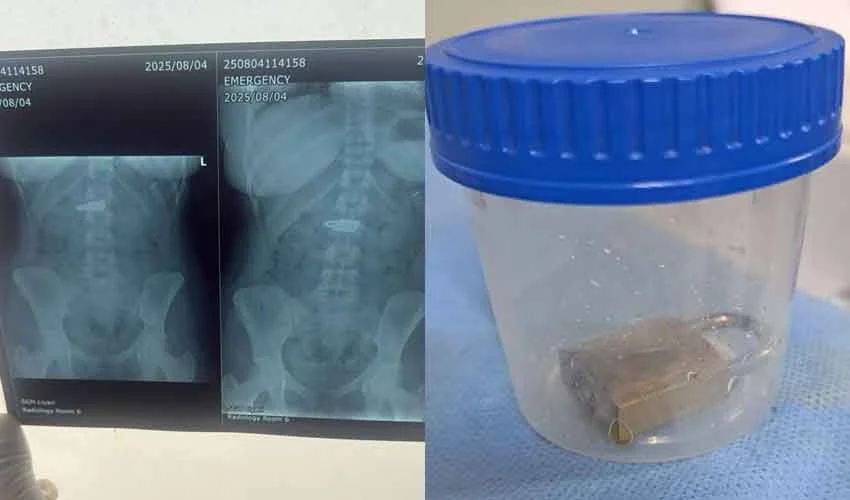A Startling Medical Mystery in Karachi
In a remarkable display of medical precision and expertise, doctors at Lyari General Hospital in Karachi successfully removed an iron lock from the stomach of a 23-year-old mentally challenged woman — without performing traditional surgery. The unusual and high-risk procedure has drawn attention from medical circles across the country for its complexity and successful outcome.
The young woman, a resident of Malir Khokhrapar, was rushed to Lyari General Hospital in the early morning hours in a critical condition. Medical staff initially struggled to determine the cause of her distress until imaging tests revealed a shocking discovery — a solid metal padlock lodged inside her stomach.
Rare and High-Risk: Mental Health and Foreign Object Ingestion
Foreign body ingestion is not entirely uncommon in medical practice, particularly among children or individuals with certain psychiatric or developmental disorders. However, swallowing a large, metallic object like a padlock is extremely rare — and highly dangerous.
Dr. Anjum Rehman, who led the medical team handling the case, explained that the woman’s mental health condition was a critical factor in the incident. “This wasn’t a routine case,” she said. “The patient was mentally impaired, and cases like these require a very delicate and thoughtful approach, both medically and ethically.”
Patients with mental disabilities can sometimes exhibit pica, a psychological disorder characterized by an appetite for non-nutritive substances such as metal, paper, or soil. If not diagnosed or treated in time, pica can lead to serious health complications.
Choosing Laparoscopy Over Traditional Surgery
Given the unusual nature of the object and the patient’s vulnerable condition, the medical team made a swift but cautious decision: instead of an open surgery, they would attempt to extract the lock via laparoscopy — a minimally invasive technique involving small incisions and the use of a camera and surgical tools.
“Open surgery would have posed higher risks of infection, complications, and prolonged recovery,” said Dr. Rehman. “Laparoscopy allowed us to remove the foreign object with much less trauma to the body.”
The procedure was completed successfully, and the lock was removed without any damage to the internal organs. According to the hospital administration, the patient is now in stable condition and under observation in the post-operative recovery ward.
The Importance of Timely Diagnosis
Medical experts emphasized that quick diagnosis and intervention were vital in saving the patient’s life. Metal objects in the digestive tract can cause life-threatening complications, including internal bleeding, perforation, and infections if not addressed immediately.
“Ingested metal objects are not only mechanically harmful but can also cause toxic reactions in the stomach,” explained one senior surgeon from the hospital. “If this lock had remained longer inside the patient, we could have been dealing with organ damage or sepsis.”
Raising Awareness Around Mental Health and Safety
This incident also brings to light the urgent need for greater awareness and care for individuals with mental or cognitive impairments. Families and caretakers of such individuals should remain vigilant, as the ingestion of foreign bodies may be a sign of underlying psychological distress or undiagnosed disorders.
Mental health remains a neglected area in many parts of Pakistan, particularly among lower-income communities. According to the World Health Organization, nearly 24 million Pakistanis suffer from mental health issues, but access to psychiatric care remains limited. In many cases, conditions like pica, schizophrenia, and developmental disorders go untreated due to stigma or lack of resources.
A Medical Success Story — But a Deeper Issue Remains
While the successful laparoscopic extraction of a metal lock from a young woman’s stomach stands as a testament to the medical capabilities at Lyari General Hospital, it also serves as a reminder of the broader challenges within Pakistan’s healthcare and mental health systems.
For now, the patient is safe — a result of fast action, skilled hands, and modern medical technology. But experts hope the case will prompt more discussions on early mental health intervention and preventive care, particularly for vulnerable populations.















